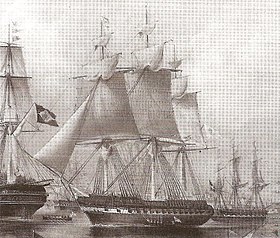AN AUSONIAN TALE
the Kingdom of Naples in the XIX century
PROLOGUE
“Sauvez ma face!”
Gioacchino Murat, King of Naples
Reggia di Portici, near Naples, 2 March 1815 3.43 am
“My lord…the news that you were expecting…”
“Sire” whispered the private secretary of Joachim Murat, King of Naples, from behind the heavy oak door of the royal bedroom. “Sire… - my lord, you asked to be awoken if some news came… Sire…” The voice was steadily becoming louder now, and followed by knocking from the despairing secretary.
After a couple of minutes a voice boomed from inside: “Who the hell dares to disturb my sleep!? – Am I a servant, to be roused in the middle of the night?” “But sire, you said…” came the weak answer of the secretary, who was opening the door. Seeing him Joachim calmed down: “Oh, it’s you Gennaro[ii], come inside, pray tell me what happened - I hope it’s something of the utmost importance.”
“Sire, the Eagle has landed, the Emperor is back to France!”
“What?... And you tell it like this? We don’t have a moment to lose!” The King almost jumped away from the bed, and such was his hurry and excitement, that he didn’t notice that his foot had become tangled up in some piece of clothing, that had been discarded on the floor by a “close acquaintance of him”[iii] some hours before.
Murat staggered - “Sire, be caref…”, the advice of the good Gennaro came too late to be useful - the king, still not completely awake, flailed about for an instant, before crashing ruinously upon a richly engraved night table[iv].
Gennaro rushed to help his King, and saw that his face was already covered in blood.
“Sauvez ma face[v]”,was all that the great man could whisper, before his eyes rolled back and he lost conscience.
NOTES:
i- This was the usual residence of Murat, when he was King of Naples (http://en.wikipedia.org/wiki/Palace_of_Portici)
ii- Invented character, Gennaro is a very common name in Naples
iii- A ballerina from the San Carlo Theatre
iv- This is the POD, quite obviously. See the bedchamber of Joachim here: http://cir.campania.beniculturali.i...ntesco/la-camera-da-letto-di-gioacchino-murat
v- In OTL this were his last words before being executed after being captured by the Bourbons: “Sauvez ma face, visez mon cœur, feu!” (spare my face, aim to the heart, Fire!) – he was vain but brave to the very end…
Last edited:



